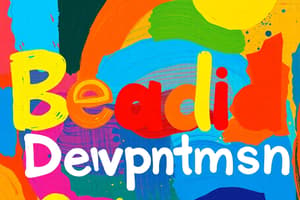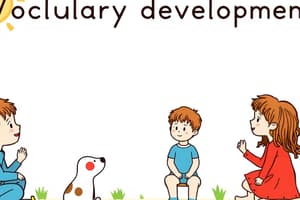Podcast
Questions and Answers
Match the language terms with their descriptions:
Match the language terms with their descriptions:
Nouns = Names of people, places, or things Verbs = Action words that describe what someone does Adjectives = Words that describe nouns Adverbs = Words that modify verbs, adjectives, or other adverbs
Match the teaching strategies with their benefits:
Match the teaching strategies with their benefits:
Creative writing = Encourages active use of new vocabulary Role-playing = Enhances engagement with language Descriptive adjectives = Helps in understanding features of subjects Contextual learning = Eases grasping new word meanings
Match the vocabulary expansion methods with their examples:
Match the vocabulary expansion methods with their examples:
Introducing synonyms = Enormous or gigantic for big Using various parts of speech = Incorporating adverbs and adjectives Engaging in classroom activities = Discussions about animals using descriptive terms Providing familiar contexts = Linking new words to existing knowledge
Match the educational frameworks with their focuses:
Match the educational frameworks with their focuses:
Match the roles of teachers with their actions:
Match the roles of teachers with their actions:
Match the types of vocabulary with their characteristics:
Match the types of vocabulary with their characteristics:
Match the components of language with their descriptors:
Match the components of language with their descriptors:
Match the outcomes of effective language teaching with their descriptions:
Match the outcomes of effective language teaching with their descriptions:
Flashcards are hidden until you start studying
Study Notes
Role of Early Childhood Education Teachers
- Teachers are pivotal in children's language development, introducing advanced vocabulary and complex structures.
- Advanced vocabulary should relate to concepts already understood by students to enhance comprehension.
Strategies for Vocabulary Enhancement
- Utilize a range of parts of speech—nouns, verbs, adverbs, adjectives, prepositions—to introduce new terms.
- Contextual examples, such as using "enormous" or "gigantic" when discussing the concept of "big," help students connect with new vocabulary.
Classroom Activities for Vocabulary Application
- Incorporate new language forms into diverse classroom activities, such as lessons on animals using descriptive adjectives (e.g., "slender snake," "furry rabbit").
- Engage students in creative writing and role-playing, prompting them to use and internalize advanced language naturally.
Benefits of Advanced Vocabulary Instruction
- Expanding vocabulary aids in articulating complex ideas and fosters a deeper engagement with academic content.
- Improved communication skills are essential for academic success and effective everyday interactions.
Educational Framework Alignment
- Teaching strategies align with educational frameworks that prioritize language interactions, supporting cognitive and linguistic growth.
Creating a Dynamic Learning Environment
- Teachers can cultivate a stimulating environment that promotes significant language development in young learners through strategic instruction and varied activities.
Studying That Suits You
Use AI to generate personalized quizzes and flashcards to suit your learning preferences.




